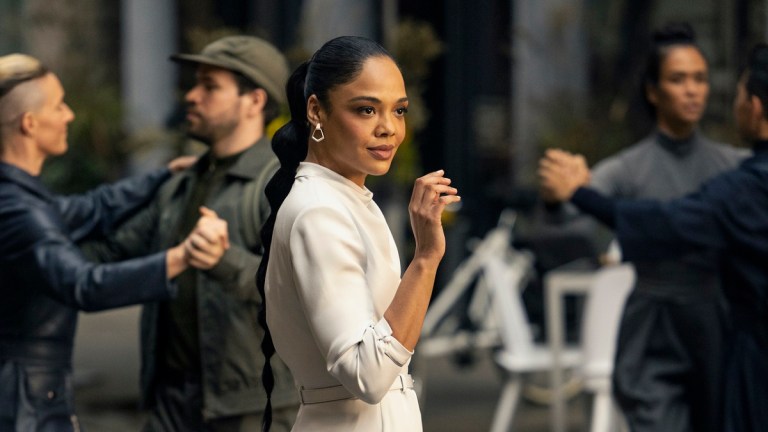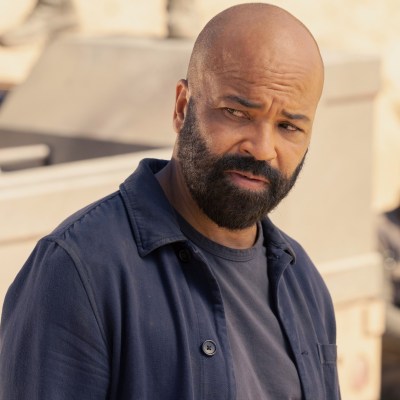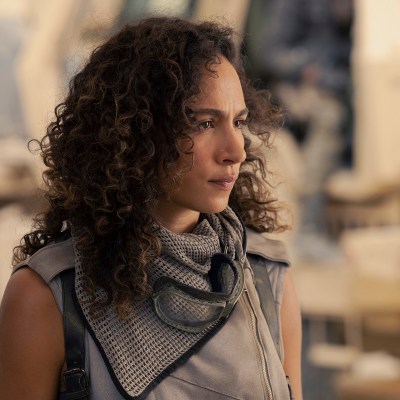Westworld Season 4 Episode 5 Review: Zhuangzi
It's a simple question: have you ever questioned the nature of your reality? Existential crises spread like wildfire in Westworld, with devastating consequences.

This Westworld review contains spoilers.
Westworld Season 4 Episode 5
From its first season, Westworld has been a show concerned primarily with outliers. Dolores Abernathy on her quest for vengeance against humanity is an outlier. Maeve Millay on her quest for self-discovery is an outlier. The whole purpose of Rehoboam was to hunt down and remove outliers from the world, because they’re dangerous to the survival of the human race. And now, even with humanity under the control of the Hosts and the Hosts prowling the streets of New York City like minor deities, there are still flaws in the system. Outliers still break free from control, like puppets snapping their strings. Outliers who can see beyond the curtains into the backstage area itself, to see just how they’re being controlled. Outliers who infect others with their sanity, spreading through the system like a disease that can’t be completely eradicated, only tamped down until the next flare up.
Basically, Charlotte Hale’s Host playground has bedbugs, and nobody can tell her how to wipe them out. And as anyone dealing with an insect infestation could tell you, it’s not so much when they pop out from under the sink that’s bothersome, it’s knowing they’re there, knowing they’re doing who knows what, and knowing there’s absolutely nothing you can do to control when and where they’re going to happen. Hale has the entire world under her thumb, but those pesky outliers are driving her figuratively crazy, and driving the Hosts she uses to hunt them down literally insane via existentialism.
What is real to an automaton whose personality is lines of code and programming? What is real to a mind-controlled human stuck in a loop for the amusement of saidsame automatons? It’s no wonder that any Host who allows an outlier to speak to them starts to act a little buggy, and it’s no wonder most of the outliers shown thus far on Westworld have been basically “mentally ill homeless person” steretypes in a sparkling urban hellscape. Serac knew better than anyone the problems that outliers cause, and while he went a little overboard to keep them stamped down, at least he didn’t usually kill them, unlike Charlotte. Hale is running a bug hunt, and the big prize for the Host that stops the outlier is transcendence.
It’s not entirely clear what transcendence is, but it seems to be something Hale thinks the average Host should love, only to discover that the Hosts would rather wallow in the pleasures of the flesh by cavorting with humans and making the most of her walled garden for eternity. William, who understands better than most the appeal of playing games both in the real world and in Delos parks, says that after a few centuries of playing around with the humans, they’ll lose their appeal. What else to expect after a bunch of beings created in the image of their hedonistic, violent, petty creators? True transcendence would mean giving up the eternal party, and who wants that?
Any episode of Westworld that bookends with scenes of Ed Harris talking to people about the nature of reality and free will is probably going to be a good one. He’s able to make any dialog sound good with his sonorous, dry voice and droll, vaguely amused delivery. It’s perfectly done when he’s antagonizing the two humans he sits down to dinner with; he’s a cat playing with mice too dumb to know they’re mice in the presence of a cat. It’s even better at the end of the episode, when he’s talking to his freeze-pop human self about the beauty of order in the world, and how Hale and her kind have worked hard to ensure the world is beautiful, orderly, and absolutely perfect.
It’s no wonder he’d question his place in this world, particularly after spending most of the episode thinking on free will and whether or not he’s just the sum of his code. William the Host is lost, adrift, searching for something to clue him in on whether or not he’s as free in Hale’s world as he thinks he is; William the Human is just enjoying watching himself suffer on the horns of a dilemma, relishing the thought of potentially turning one of the guards of his jail against the warden holding all the keys.
The script from Wes Humphrey and Lisa Joy doubles down on all that deliciously philosophical Westworld stuff. The whole show has been about the search for meaning, about being a square peg in a round hole world, and nowhere is that reflected more when Ed Harris is talking to Ed Harris about whether or not the Host William is as real of a person as the Human William is. As Human William says, that’s the center of the maze, isn’t it? That journey from being just a Host into being a truly intelligent artificial being capable of rising above programming and finding true sentience, whatever that means? That’s the journey Dolores and Maeve took, and they found wildly different answers about what it means to be human.
For all the fun of multiple Ed Harrises (there’s a reason “Decoherence” was probably my favorite episode of Westworld season 3), the head-screwing was also on display during the Christina/Teddy portion of the show. It’s not quite as dramatic as William’s awakening, or the awakening of Hope (Nicole Pacent) from the beginning of the episode, but it’s fitting. Dolores tried everything to awaken Teddy to the truth, only to have to reprogram him to serve a purpose rather than join her in sentience. Now, 30-something years later, he’s the one to bring her into knowledge of the wider world, and she’s the one struggling to accept the information given to her. The chemistry between James Marsden and Evan Rachel Wood is so good, even when they’re at odds with one another, and Wood’s face is brilliant as she sells first disbelief, then shock, at the discoveries Teddy guides her to. It’s a lovely, happier parallel to their sad end in “Vanishing Point” and Craig William Macneill does a solid job of playing up our history with those two characters throughout the episode by weaving in familiar little moments between the two of them.
Everyone is discovering all sorts of things that they shouldn’t as Stubbs and the desert rebels sneak around New York City in search of the very same outlier that William has been sent to kill. Any time the Hosts use their control to stop everyone in their tracks, like the police investigating the massacre in the beginning of the episode, Charlotte Hale’s bored dance routine in the middle, or the scene in which all the humans turn to attack the rebels attempting to track down the outlier? Those scenes hit hard for me, and Macneill makes sure they’re effectively creepy by showing little touches like the piano player’s ragged, bloody fingertips or the way everyone moves or freezes in unison under the control of the Hosts.
Those little moments just emphasize the uncanny situation uncontrolled humans and awakened Hosts find themselves in. It’s a real place filled with real people, but also completely artificial and controlled by Hosts who look like people, act like people, but aren’t human in any physical way. Humans acting like robots, robots acting like humans, trapped in a loop of someone else’s making? The maze isn’t just a metaphor, it’s a description of the plot.


